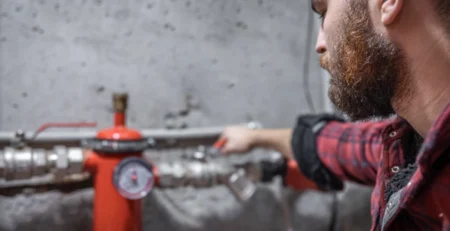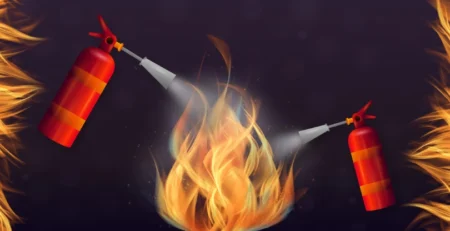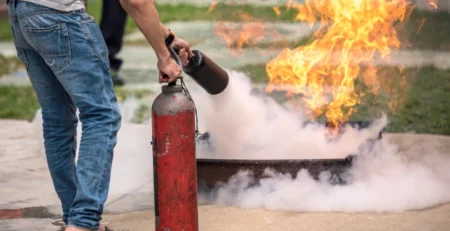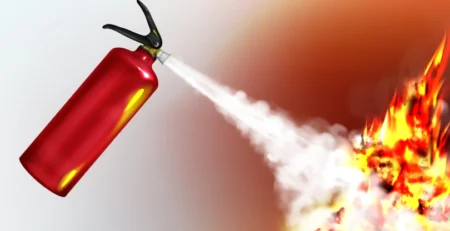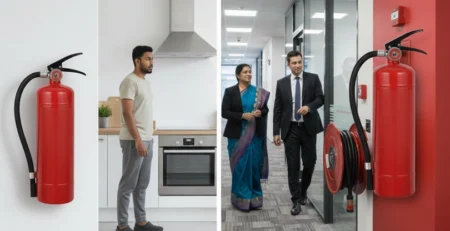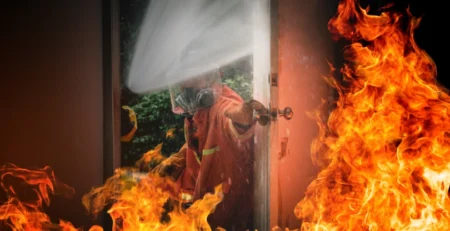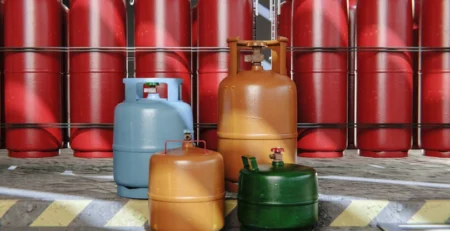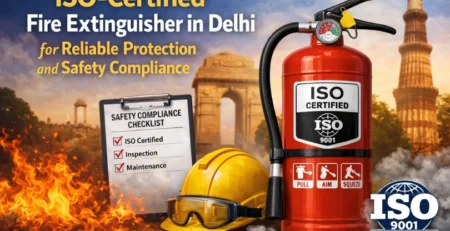Pick The Right Fire Extinguisher Manufacturer for Electrical Safety in Homes and Offices
Fires are dangerous and lead to devastation of properties and lives. However, electrical fires, or fires started from electrical hazards, are particularly dangerous. They spread rapidly, have live current, and can reach very high temperatures. On top of that, using standard fire extinguishers for such cases can lead to electrocution and severe shocks. That is precisely why special extinguishers are used to deal with electrical fires safely. As the trusted and ISO-certified fire extinguisher manufacturer in India, Somya Pyrotek Services provides effective and safe solutions for electrical fires.
In this blog, we will cover the types of fire extinguishers used for electrical fires and provide you with critical safety measures to deal with electrical fires. Moreover, we will highlight the importance of choosing the right fire extinguisher supplier to ensure complete electrical protection for your homes and offices.
What Kind of Fire Extinguishers are Used for Electrical Fires?
There are three classes of fires, namely Class A, Class B, and Class C. The third class, or the C class, fires are generated from an electric source and are particularly difficult to control or extinguish. Instead of using water-based extinguishers, special fire extinguishers that use dry powder extinguishing media are used. This prevents electric shocks and short circuits, controlling the situation effectively, keeping the damage to a minimum. Being a leading fire extinguisher manufacturer in India, we supply a wide range of reliable products for electrical safety. You can see their details below:
- Trolley CO2 Fire Extinguisher
- Clean Agent Fire Extinguisher
- Modular Automatic Fire Extinguisher
- ABC/BC Powder-Based
You can refer to our Product Page for more detailed product specifications.
The following table will give a clear distinction between standard and electrical fire extinguishers:
| Feature | Standard Fire Extinguishers | Electrical Fire Extinguishers |
|---|---|---|
| Media Types | Water, foam | CO₂ (Carbon Dioxide), Dry Chemical Powder (ABC) |
| Suitable For | Class A fires (wood, paper, textiles) | Class C fires (electrical equipment) |
| Electrical Safety | Not safe – conducts electricity | Safe – non-conductive |
| Extinguishing Method | Cools or smothers flames | Removes oxygen or interrupts chemical reaction |
| Damage to Equipment | Can damage electrical/electronic devices | Minimal damage to equipment |
| Usage | General-purpose fire-fighting | Fires involving live electrical equipment |
Critical Safety Measures for Electrical Fire Situations
Dealing with electric fires without appropriate knowledge can lead to severe outcomes and put lives at risk in the worst-case scenario. The following points will provide you with safety measures, allowing you to deal with electrical fires effectively:
1. Immediately Cut the Power Supply
If you are aware that an electrical appliance or its components started the fire, cut the main power supply immediately. This will minimize the risk and protect you from any chance of electric shock. Additionally, a constant electric supply during a fire situation will make it difficult to extinguish the flames.
2. Do Not Use Water at All
Using water on an electrical fire will neither diminish the flames nor cool it down. On the contrary, water will cause a short circuit, increasing the risk of electrocution. Therefore, in the absence of a fire extinguisher, either use a heavy cloth or sand.
3. Use Appropriate Extinguisher
When picking a fire extinguisher for homes and offices, make sure it is compatible with C-class fires. Using an appropriate fire extinguisher will reduce the risks of electrical hazards while effectively controlling the fire.
4. Open Windows for Proper Ventilation
Fire extinguishers for electrical fires generally contain CO2, which reduces oxygen in the surroundings. Therefore, before you use the fire extinguisher, make sure there is proper ventilation to avoid the risk of suffocation.
5. Leave the Area
If you do not have the appropriate fire extinguisher and the fire is getting out of control, the best course of action is to leave the area. Do not try to put out the fire without appropriate measures, as it can risk your life.
6. Choose the Right Fire Extinguisher Supplier
This is a proactive measure to deal with electrical fires. When picking fire extinguisher manufacturers for your house or office, make sure that the supplier is authentic and has all the required security certifications. This will ensure that you have high-quality products that you can rely on for complete protection.
Wrapping It Up!
Choosing the proper fire extinguisher manufacturer in India is crucial to protect your homes and offices from fire hazards. The manufacturer’s role is critical for ensuring complete safety solutions. They are responsible for providing all-around solutions, including electrical fires. For example, Somya Pyrotek Services offers fire extinguishers with powder media that are safe and effective against electrical fires. On top of that, we are an ISO-certified company, which you can trust for high-quality products.
Partner with us to provide enhanced protection for your home and workplace.
FAQs
A: There are mainly three classes of fire–Class A, Class B, and Class C. Each class of fire has different sources and other distinctions. Learning about them is highly beneficial as it helps you to choose appropriate methods for dealing with fire effectively and safely.
A: Common causes of electrical fires are listed below:
- Overloaded circuits – Drawing too much current from one outlet or circuit.
- Faulty wiring – Damaged, old, or poorly installed electrical wiring.
- Loose connections – Loose plugs or outlets causing sparking and overheating.
- Outdated electrical systems – Old fuse boxes or panels are unable to handle modern loads.
- Overheated appliances – Prolonged use of high-wattage devices.
- Damaged cords – Frayed or pinched power cords causing short circuits.
- Short circuits – Direct contact between live and neutral wires.
- Electrical arcing – Sparks from faulty switches or outlets.
- Defective electrical equipment – Malfunctioning devices or poor-quality appliances.
A: If you are choosing a fire extinguisher for household and workplace applications, make sure that they are powder-based. This is because in household and corporate settings, fire usually starts from electrical faults and equipment failures. Consequently, you can ensure versatile protection for multiple purposes.
A: CO2-based extinguishers are ideal for electrical fires as they do not conduct fire and also prevent damage to the equipment. CO2 also cools pretty quickly, which means quick action and faster extinguishing. Additionally, the lack of moisture in these fire extinguishers makes them safe for electrical fires.


